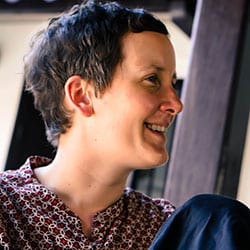A trilingual adventure with Benjamin and Berman
By ucyow3c, on 1 December 2014
![]() Written by Jake Christophersen (MA student, UCL Centre for Multidisciplinary and Intercultural Inquiry)
Written by Jake Christophersen (MA student, UCL Centre for Multidisciplinary and Intercultural Inquiry)
‘Equivalence’ is a word that has occupied a central part of translation theory since the very foundation of the discipline. How important does this term become when embarking on a ‘trilingual translation journey’? The third instalment of the Translation in History lecture series, which was given by Dr Chantal Wright from the University of Warwick, dealt with the question of equivalence in translation as well as fundamental questions, such as ‘Why do we translate?’
The audience was taken on a translational voyage through the various aspects of Dr Wright’s current research project of translating Antoine Berman’s 1984–85 lecture series, a commentary of Walter Benjamin’s ‘The Task of the Translator’, and the trouble the translator encounters in the process.
Dr Wright began the lecture by introducing the audience to both Berman and Benjamin, renowned translation theorists and their work, followed by a discussion on the motivation for translating and who translation is for.
Providing concrete examples of difficulties encountered at an early stage of the translation process, Dr Wright effortlessly held the attention of the congregation of translation enthusiasts attending her lecture.
In the winter of 1984–85, French translation theorist, Antoine Berman held a lecture series at the Collège international de philosophie in Paris on Walter Benjamin’s essay, ‘The Task of the Translator’.
After Berman’s death, the lecture series was published as ‘L’Âge de la traduction’ in 2008 by his wife, Isabelle Berman, and Valentina Sommella, based on 10 notebooks and recordings of the lectures. It provides the reader with a line-by-line commentary on Benjamin’s seminal text by one of the most prominent translation theorists of the Francophone world.
Dr Wright considered how Berman’s voice has been carried through by his wife, which is immediately apparent in his introduction, or ouverture, where one finds typical ‘Bermanisms’ in the shape of the author’s objectivity by using the French personal pronoun nous and his way of ‘teasing the audience’ by not allowing subjectivity to enter the work.
Harry Zohn was the first translator to translate Benjamin’s essay into English, and was heavily criticised by Steven Rendall, who argued that Zohn’s version included numerous mistranslations. Rendall went on to produce his own translation.
A further two translators have translated the works since, namely J. A. Underwood and a translation team, consisting of Hynd and Valk. Dr Wright intends to use these four English translations as reference material when producing her own translation.
Dr Wright discussed the difficulty of ‘non-equivalence’ throughout the lecture and provided a specific example with the German intransitive word gelten (to apply, count, pertain) and its proximity to the French valoir (apply).
However, a major issue with this word is the fact that an exact equivalent does not exist in English. At this stage, she suggests pertain as a fitting compromise.
Dr Wright presented four different reasons for translation: humanism, ideology, reading and writing.
Edith Grossman, an American Spanish-to-English literary translator, is a strong supporter of humanism as motivation for translation. She argues that it allows for access to foreign literature, leading to a ‘World Literature’ which facilitates a connection with the unfamiliar and builds bridges between cultures.
Peter Filkins, who translated H. G. Adler’s novels into English and, thereby, boosted his significance, is an example of a translator working from humanist principles. Filkins is famous for his translations of Holocaust writing.
Dr Wright drew our attention to the fact that, even with the best intentions of objectivity, there is always an ideological element in translation. A prime example of this is the translation of A Thousand and One Nights by Sir Richard Burton, which specifically illustrates Saїd’s concept of ‘Orientalism’.
Dr Wright, drawing on Jean Boase-Beier’s work, explained that the element of reading and writing as a motivation for translation has underlying factors such as the pleasure gained from reading. She explains that implicatures in poetry add to this pleasure and that translation is, in fact, an outcome of reading.
In my opinion, one particularly fascinating point that Dr Wright made is the fact that when looking at Benjamin’s seminal text, we are unconsciously made to question our rationale when translating and take the four above-mentioned points into account.
Dr Wright brought the lecture to a close by explaining her personal motivation for translating: creativity. She is fascinated by the various options a translator has, allowing her to integrate a part of herself into the target text.
Dr Wright is extremely enthusiastic about commencing her new adventure with Benjamin and Berman, which was undoubtedly one of the reasons for the extremely engaging and comprehensive lecture.
 Close
Close


